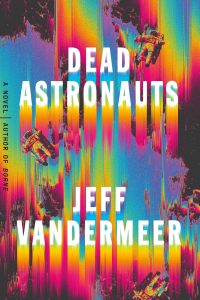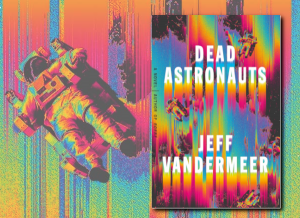DEAD ASTRONAUTS by Jeff VanderMeer (Book Review)
“You want. Things to be words. That are not words. Could never be words. Your fox is some other construct. We did not agree to that. We do not call ourselves foxes. A thing you created that is not me. To think an autopsy was a person. To think a dissection meant a type of mind. If I went rummaging through your carcass, would I find you?”
 A lesser author than Jeff VanderMeer would have followed the success of his iconic Southern Reach trilogy by mellowing his approach to embrace a larger audience. Fortunately for us, VanderMeer shows no signs of slowing down or becoming less weird, thought-provoking and daringly experimental. Dead Astronauts (2019), a standalone novel set in the same universe as Borne (2017), builds on the hallucinogenic, bonkers power of that previous novel to create an even more bold and mind-bending examination of humanity’s relationship with the natural world and the consequences of our abuse of it. The end result is a dizzying, disorienting yet powerful and compelling read that forces the reader to question our place in the world, and the ethical implications of climate change and species extinctions.
A lesser author than Jeff VanderMeer would have followed the success of his iconic Southern Reach trilogy by mellowing his approach to embrace a larger audience. Fortunately for us, VanderMeer shows no signs of slowing down or becoming less weird, thought-provoking and daringly experimental. Dead Astronauts (2019), a standalone novel set in the same universe as Borne (2017), builds on the hallucinogenic, bonkers power of that previous novel to create an even more bold and mind-bending examination of humanity’s relationship with the natural world and the consequences of our abuse of it. The end result is a dizzying, disorienting yet powerful and compelling read that forces the reader to question our place in the world, and the ethical implications of climate change and species extinctions.
Borne took place in a world destroyed by capitalist exploitation, in the ruins of a City in the shadow of the Company, whose derelict buildings still churn out biotech creations into the transfigured wastelands. In Dead Astronauts, we realise that the Company has spread its malignant influence not only over the Earth, but through multiple alternate universes as well. The novel follows the story of Grayson, an astronaut who returned to Earth to find it irreparably damaged by the Company; Chen, an ex-worker for the Company who has been altered to transform into a swarm of salamanders; and Moss, a shapeshifting posthuman able to exist as an individual or a cloud. These three ragtag rebels travel from universe to universe, encountering the City and the Company in each one, looking for an iteration in which they might succeed in their relentless battle against the Company. The novel also tells the tale of Charlie X, the mastermind behind the biotech that has destroyed the world, his mind in turn ravaged by his creations and the responsibility of his actions, and Sarah, a homeless woman who finds Charlie’s journal containing the secrets to his dark creations and is haunted by demons, and the blue fox, a creation of the Company who rebels.
All of this gives an indication of just how strange and disorienting Dead Astronauts is. The novel crosses different universes and timelines, is told out of order, and darts between a number of different viewpoint characters, many of them not human. Fearlessly experimental, the book plays with format and presentation in order to convey the alienness of its various characters. The reader is meant to be disoriented and surprised, and indeed the book keeps the reader constantly on their toes. As the fox explains, language, literature and words are tools of humanity, that we use in order to explain and categorise the world around us in a way that privileges us. The animal, the nonhuman and the posthuman require their own forms of expression, native to them, and it is right that we experience a little discomfort as we strain to find a space in which we can all communicate. This is VanderMeer’s great project, one that runs through his Southern Reach novels, Borne, and Dead Astronauts. As long as we only accept the nonhuman on our own terms and not their terms, we will continue to reinforce the destructive hierarchy that centres humanity and positions nature as less important.
Dead Astronauts is concerned with the ethics of our relationship to the environment, and VanderMeer points out how frequently destructive and exploitative we our to our own planet and the other beings who live on it. Charlie and the Company play god, experimenting on animals and remaking them painfully and violently in new forms. In the literary tradition of Mary Shelley’s Frankenstein (1818), VanderMeer shows us how Charlie’s abusive, destructive world view, born out of his own trauma, leads him to become a monster, creating without concern for the life he is creating, destroying with impunity. But VanderMeer is not content to show us this merely from Charlie’s perspective or from the humans like Grayson who condemn him and his actions. By putting us in the perspective of the biotech creations and modified animals, like the blue fox, and allowing us to experience their trauma at the hands of wrongly applied science, VanderMeer makes the horror and the pain a visceral experience for the reader.
Dead Astronauts, for all its dizzying complexity and bold experimentalism, is still a remarkably readable book. VanderMeer manages to make his characters compelling and his prose is deliriously beautiful, drawing the reader in even throughout the sections where they might have no idea what is going on. It is a bleak book, one that sees the full extent of humanity’s cruelty both to nature and the environment but also to humanity itself. Even those who find a way to fight back against the Company are doomed to fail again and again. However, even within this darkness, VanderMeer manages to find some light. Grayson, Chen and Moss are transfigured and illuminated by their love for each other. Whilst this opens all of them up to the potential of further pain, the power of their feelings for each other inspire them to carry on against the odds, and provide moments of light and happiness that allow them to accept the darkness of their fates.

